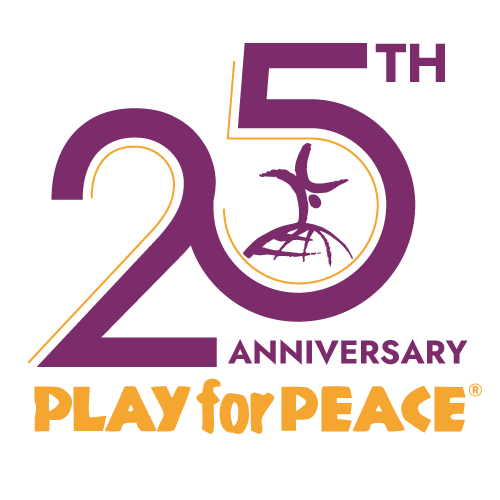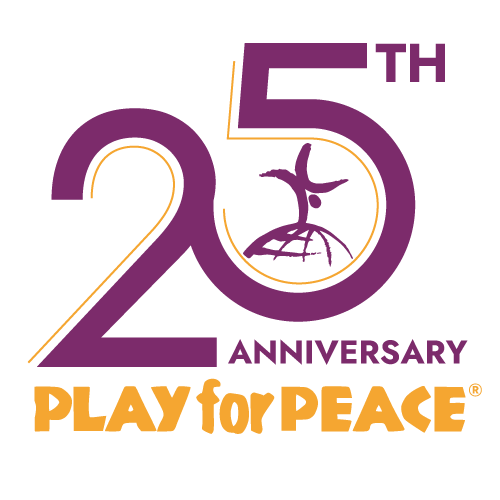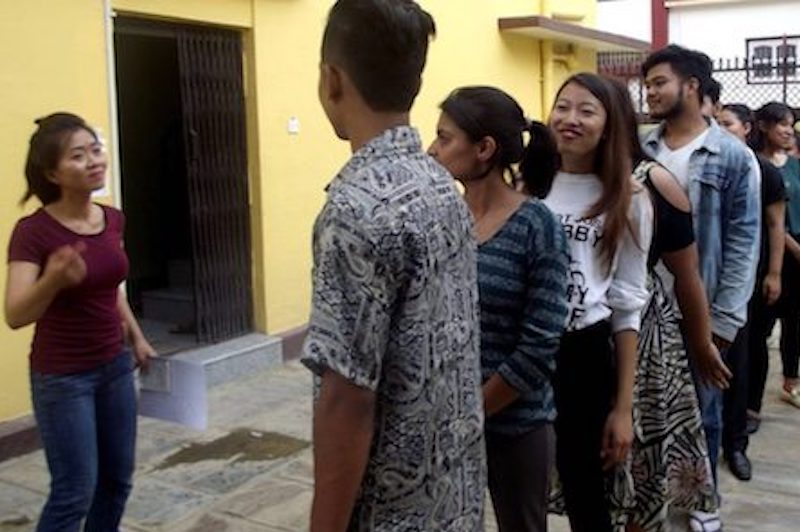Last month, Play for Peace certified Trainer Rita Nguyen visited our Play for Peace Club in Kathmandu, Nepal. She met passionate and energetic youth leaders who are working hard to create a thriving community.
Nepal is a deeply spiritual country in southern Asia bordering the eastern part of India. The country is still recovering from a devastating earthquake in 2015 that killed about 9,000 people and injured 22,000 more. Much of the area’s infrastructure and religious sites were destroyed. Roads are now dusty during dry season and muddy during rainy season since the pavement was damaged and not rebuilt.
On June 27, Rita visited the Global Peace Youth Corps (GPYC) club in Kathmandu, Nepal’s capital city, and spent time with the ten core members of the club. “I learned a lot about how the club works and what social issues they address in Nepal. We also shared games, which was great because I learned new games from them and shared energizer games and other activities that were unfamiliar to them. It was a fruitful exchange, and the club members were very interested in learning more about Vietnam and our Play for Peace work there,” said Rita after her visit. “Many of the core club members were very young, passionate and confident about their work. They know a lot about social challenges in their communities and are eager to support the community through their work. They asked a lot about the Play for Peace global community and were inspired by being part of this global network.”
The GPYC is one of two Play for Peace partner organizations in Nepal. It is a nonprofit organization focusing on youth leadership and community transformation through informative education and community building. Runny, one of two full-time GPYC employees is also the mentor for the Play for Peace club. When Play for Peace trainers Sam and Sarah first introduced Play for Peace, Runny wasn’t convinced about the impact cooperative games could have on children. But she observed and practiced and soon saw incredible changes in how the children interacted with one another. Now Runny and the GPYC peace club incorporate practice peace session in all of their programs, be it in schools, communities, colleges, or weekly youth gatherings. They focus on inclusion, teamwork, friendship, and compassion and use Play for Peace to fulfill their objectives of bringing peace, decreasing discrimination, and creating harmonic relationships across divides.
Runny acknowledges the power of experiential education in every Play for Peace activity, which helps youth and children open up and connect in a fun way. “We often go to orphan centers and schools to educate them about children’s rights. After the awareness program we use Play for Peace to put theory into practice. The sessions not only show the children that it is their right to play, but it also allows them to bond with each other and build trust,” she says. “Girls are particularly shy at the beginning and hesitate to participate, but they quickly get excited about playing. It’s amazing how girls and boys connect through the games. In a country where gender inequality is a big problem, this is very important.”
The club also uses Play for Peace to decrease discrimination due to different religions or castes. Using inclusive and cooperative games has helped to relieve tension among members of the different groups.
Ranju, one of the youth leaders at GPYC told Rita that facilitating the cooperative games has given her confidence, helped her to form bonds with other volunteers, and has help to develop her skills to the point that she has become a core member of the Play for Peace club. Ranju uses Play for Peace to begin every program she runs, setting the tone for cooperation and making participants comfortable. “The games are a great way to share your feelings, solve problems, get connected, and be happy—in short, bring peace to yourself and your community,” she says.
Rita was impressed with the club members’ high level of English, as well as their confidence in facilitating games. “I experienced a very special moment, when some participants welcomed me in Vietnamese and even presented a folk song, That was completely unexpected. They told me they had the opportunity to study in Vietnam for some months and picked up a bit of the language.”
Anuj, one of four participants who were able to greet Rita in Vietnamese, told her, “We had the chance to visit Vietnam for three months on a volunteer exchange program through the Norwegian government. It was like winning a scholarship for an intercultural experience, and it inspired us to learn more about other cultures. I am studying social work in Nepal, because I want to empower young people to participate in their communities. We need new techniques to motivate young people to become active citizens, and I want to be part of developing that.”



